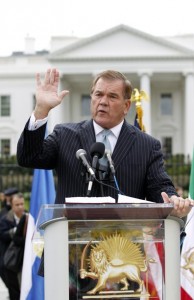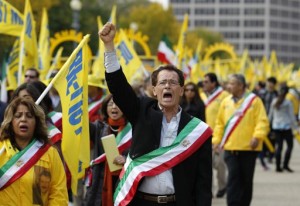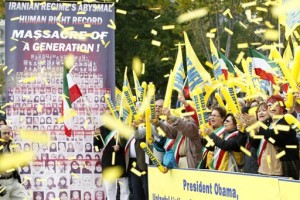PRNewswire
WASHINGTON, Oct. 31, 2011 /PRNewswire-USNewswire/ — In a panel on Friday, October 28, 2011, entitled “U.S., U.N. Obligations to Avert Impending Humanitarian Catastrophe at Camp Ashraf,” former senior U.S. national security, military and judiciary officials urged the Obama administration to honor its written commitment to the residents of Camp Ashraf and protect them from another onslaught by the Iraqi government, according to Iranian-American Community of Northern California.
Camp Ashraf is home to 3,400 members of the Iran’s main opposition, Mujahedin-e Khalq (MEK). Only eight weeks are left to the arbitrary deadline set by Iraqi Prime Minister Nouri al-Maliki to shut down Camp Ashraf and forcibly relocate the residents to their death.
The speakers urged the United States to raise the issue of Camp Ashraf at the United Nations Security Council to facilitate the stationing of the UN blue helmet forces in Camp Ashraf to protect the residents from Iraqi attacks before they are relocated to third countries.
“In 2003, we saw no evidence that the MEK should be listed as a terrorist organization. Therefore, we negotiated their disarmament and provided for their protection not as terrorists but as a military organization. My expectation at the time was that delisting would occur and the occupants of Camp Ashraf would gain the refugee status that they deserved,” said General William S. Wallace, former Commander of U.S. V Corps.
Recalling former President Bill Clinton’s regret about his inaction to avert the 1994 genocide in Rwanda, former State Department Policy Planning Director Mitchell Reiss, said, “President Clinton’s wife is now the Secretary of State and has the power to remedy the injustice at Camp Ashraf… All she has to do is delist the MEK and ensure that the residents are given safe passage out of Iraq.”
“Unless immediate action is taken, another tragedy on a much larger scale than we witnessed back in April [8th massacre at Camp Ashraf] is looming… Remember that we have a very narrow window, 65 days and counting, to accomplish these actions or there will be blood on our hands, and the world will see that America did not honor its commitment, that America did not honor its promise, and our leadership will bear the responsibility for the horrible outcome because we lacked the moral and the political courage to stand for what was right,” said General Hugh Shelton, former Chairman of the Joint Chiefs of Staff.
Ambassador Dell Dailey, former State Department’s Coordinator for Counter-Terrorism noted that “If the MEK were delisted, it would be much easier for the residents of Camp Ashraf to move from Iraq to a third country… For the sake of peace in the region, safety and the livelihood of the residents of Ashraf, and the lives of thousands of innocent people, she [Secretary Clinton] must delist the MEK now.”
Displaying the “Protected Person” ID card issued by the United States for an Ashraf resident who was killed during the July 2009 massacre, Eugene Sullivan, former Chief Judge, U.S. Court of Appeals for the Armed Forces, said, “Don’t let this identification card which gave de facto protection become a license to kill… Madam Secretary of State, delist the MEK now. Madam Secretary, keep our nation’s word. Let it be our bond.”
Admiral James Lyons, former Commander of the U.S. Pacific Fleet, while asking why the MEK has not been delisted added that the U.S. Congress “should enact and President Obama should sign into law Iran’s Liberation Act, thereby making regime change in Iran the official policy of the United States Government.”
John Sano, CIA’s first Deputy Director for Clandestine Services, told the panel that “if the Secretary of State can offer to the Libyan regime that we’ll help take care of your wounded fighters, what is she doing for the people who were massacred in April [in Camp Ashraf] and the likelihood that this will reoccur by the end of the year?”
SOURCE Iranian-American Community of Northern California


